On-boarding for Spyros Zervas SEO KNOWLEDGE SHARING: INTERNATIONAL TARGETING 05│08│2016
A presentation at Mediacom Lectorium in April 2017 in London, UK by Anton Surov

On-boarding for Spyros Zervas SEO KNOWLEDGE SHARING: INTERNATIONAL TARGETING 05│08│2016

WHY IS INTERNATIONAL SEO SO CONFUSING? Geo-targeting issues Hreflang Issues Difficult to implement Unfriendly technics Different Guidelines Rapid changes

AALITTLE little history HISTORY of international OF INTERNATIONAL SEO SEO

AALITTLE little history HISTORY of international OF INTERNATIONAL SEO SEO

A LITTLE HISTORY OF INTERNATIONAL SEO

HOW TO DEAL WITH IT?

SITE STRUCTURE ccTDL Sub-Directories Sub-Domains example.ie example.com/de/ de.example.com Pros: Pros: Clear geotargeting Server location irrelevant Easy separation of sites Expensive (can have limited availability) Separate Domain Authority Cons: Cons: Easy to set up Consolidating domain authority Low maintenance (same host) Pros: Provides weak geo-localization signals Single server location Easy to set up Can use Search Console geotargeting Allows different server locations Easy separation of sites Cons: Users might not recognize geotargeting from the URL alone (is “de” the language or country?) Lost of domain authority

SITE STRUCTURE - DONTS URL parameters IP-Delivery site.com?loc=de Cons: Expensive (can have limited availability) URL-based segmentation difficult Users might not recognize geotargeting from the URL alone Geotargeting in Search Console is not possible) Cons: Could cause cloaking Affect loading time Data can be overrated

INTERNATIONAL FACTORS

CONTENT Content Factors: Body Content Specific KWs usage Localised Metadata Localised Navigation labels Headings Image Names Localized HTML sitemaps Translated URLs Local UX Don’t use automated translation

Links + NAP Links + NAP: links from local ccTLDs pointing to your localized content info such as telephone numbers, currencies, addresses in schema markup, and Google My Business profiles Server Location Social Signals*

Webmaster Tools Goolge Search Console - g.co/searchconsole Yandex Webmaster - https://webmaster.yandex.com/ Baidu Webmaster Tools - http://zhanzhang.baidu.com/ Bing Webmaster Tools - http://www.bing.com/toolbox/webmaster Bing&Baidu is still using Meta-language

Hreflang The hreflang tag (also referred to as rel=”alternate” hreflang=”x”) tells Google which language you are using on a specific page, so the search engine can serve that result to users searching in that language. 3 Ways to implement: Put to <Head> section XML sitemap HTTP header

Hreflang in <head> <link rel=”alternate” href=”example.com” hreflang=“en-us” /> <link rel=”alternate” href=”example.com/fr/” hreflang=”fr-fr” /> <link rel=”alternate” href=”example.com/pt/” hreflang=”pt-pt” /> <link rel=”alternate” href=”example.com” hreflang=”x-default“ /> Google supports the ISO 639-1 format for language codes, and you can get more specific by using the ISO 3166-1 Alpha 2 format to signal which region you’re targeting. en: English content, not restricted to on any specific region en-US: English content, targeted at the US market en-MX: English content, targeted at the Mexican market

Hreflang in http-header HTTP/1.1 200 OK Content-Type: application/pdf Link: http://example.com/page.pdf; rel=”alternate”;hreflang=”x-default”, http://uk.example.com/page.pdf; rel=”alternate”;hreflang=”en-GB”, http://us.example.com/page.pdf; rel=”alternate”;hreflang=”en-US”

Hreflang in XML-sitemaps <?xml version=”1.0” encoding=”UTF-8”?> <urlset xmlns=”http://www.sitemaps.org/schemas/sitemap/0.9” xmlns:xhtml=”http://www.w3.org/1999/xhtml”> <url> <loc>http://example.com/page.html</loc> <xhtml:link rel=”alternate” hreflang=”en-US” href=”http://us.example.com/page.html” /> <xhtml:link rel=”alternate” hreflang=”en-GB” href=”http://uk.example.com/page.html” /> <xhtml:link rel=”alternate” hreflang=”x-default” href=”http://example.com/page.html” /> </url> </urlset>

Hreflang Common Issues No self reference used Not using absolute URLs Link to URLs with non-200 HTTP status code Invalid syntax in country and language code annotations Conflicting multiple hreflang definitions Conflicting hreflang and Google SC definitions Incomplete hreflang URL set - no return tags Example: http://example.com - hreflang definitions link to fr.example.com, es.example.com and ca.example.com. http://ca.example.com - hreflang definitions link to es.example.com and ca.example.com.
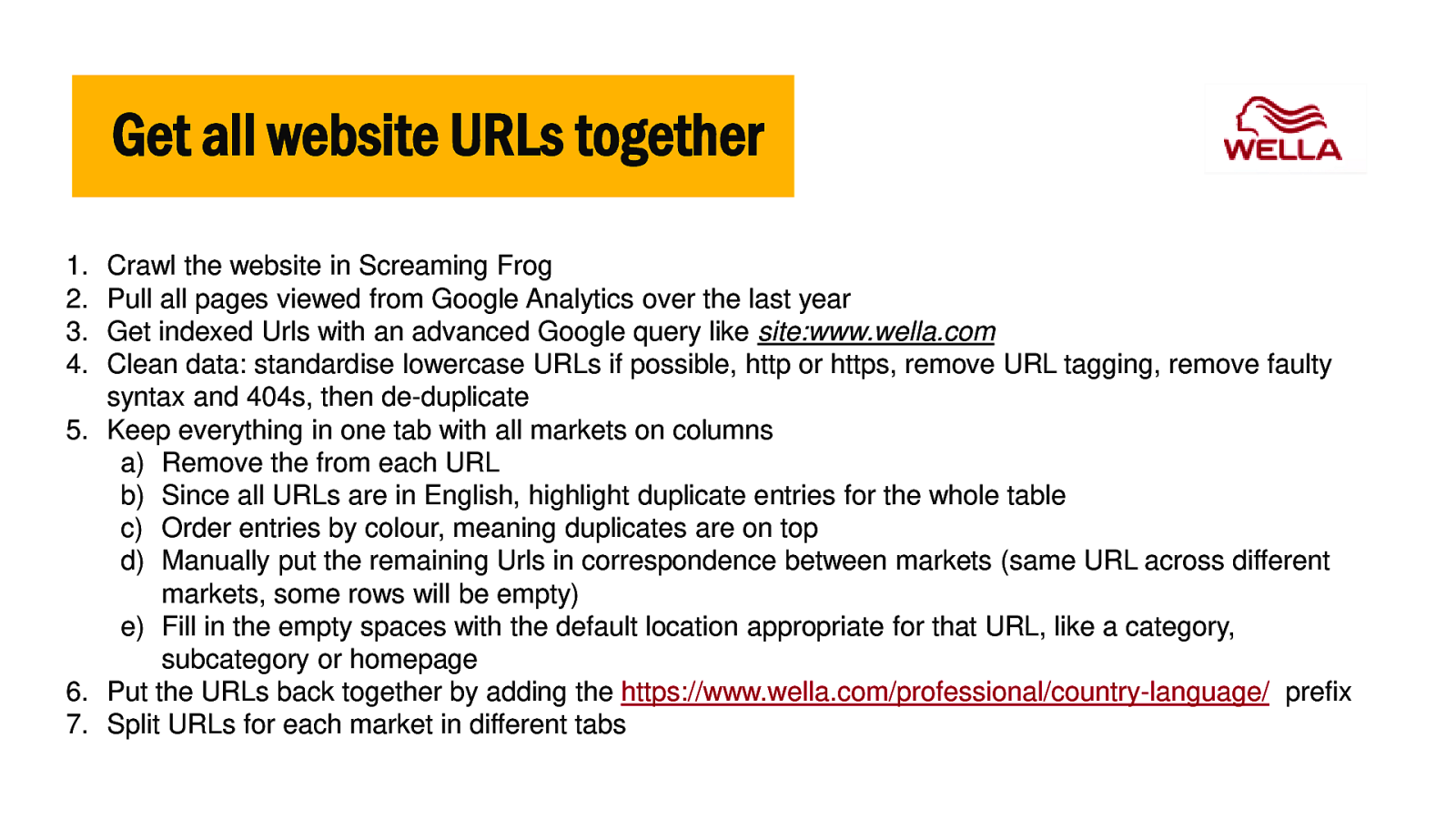
Get all website URLs together 1. 2. 3. 4. Crawl the website in Screaming Frog Pull all pages viewed from Google Analytics over the last year Get indexed Urls with an advanced Google query like site:www.wella.com Clean data: standardise lowercase URLs if possible, http or https, remove URL tagging, remove faulty syntax and 404s, then de-duplicate 5. Keep everything in one tab with all markets on columns a) Remove the from each URL b) Since all URLs are in English, highlight duplicate entries for the whole table c) Order entries by colour, meaning duplicates are on top d) Manually put the remaining Urls in correspondence between markets (same URL across different markets, some rows will be empty) e) Fill in the empty spaces with the default location appropriate for that URL, like a category, subcategory or homepage 6. Put the URLs back together by adding the https://www.wella.com/professional/country-language/ prefix 7. Split URLs for each market in different tabs
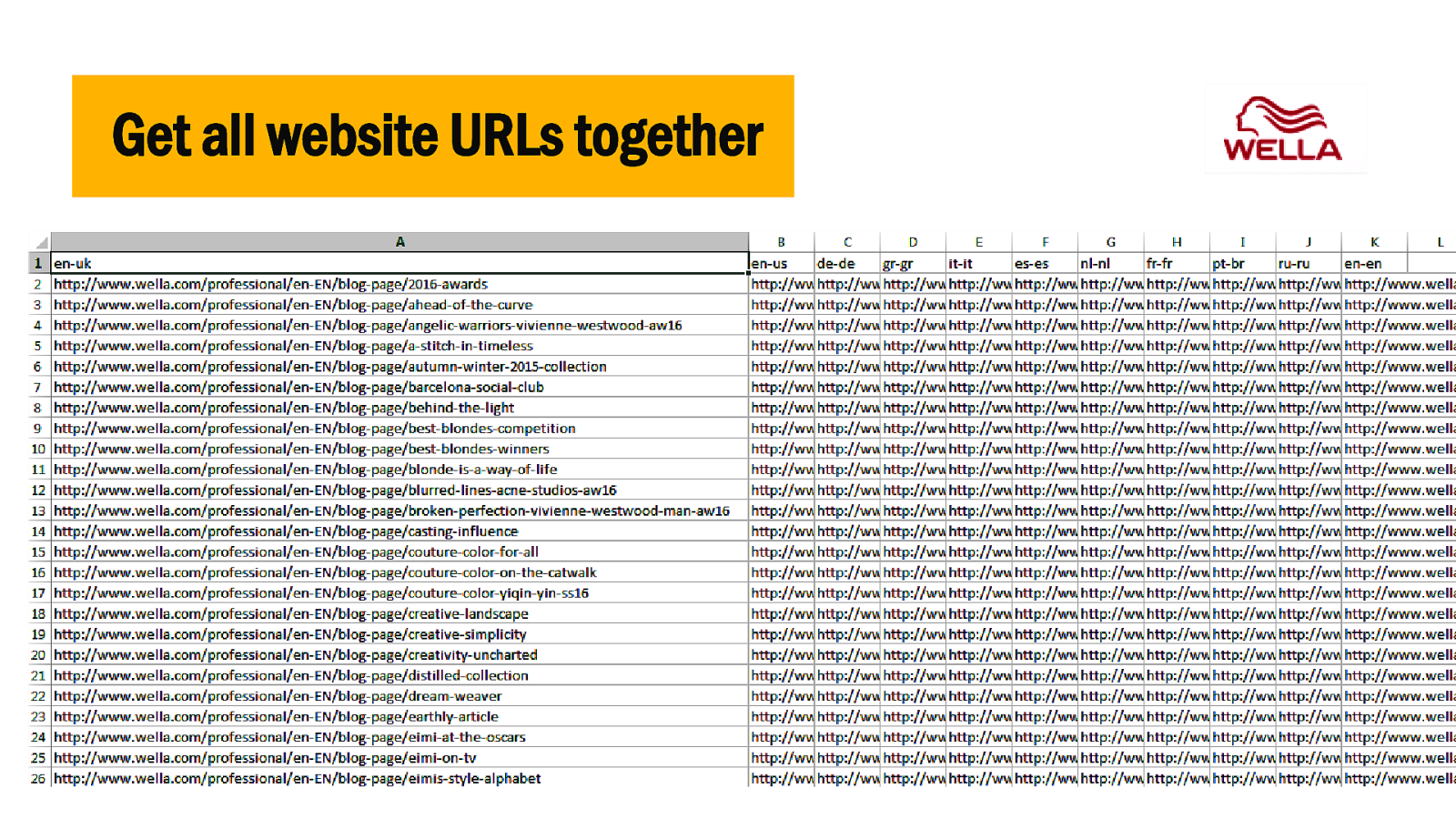
Get all website URLs together
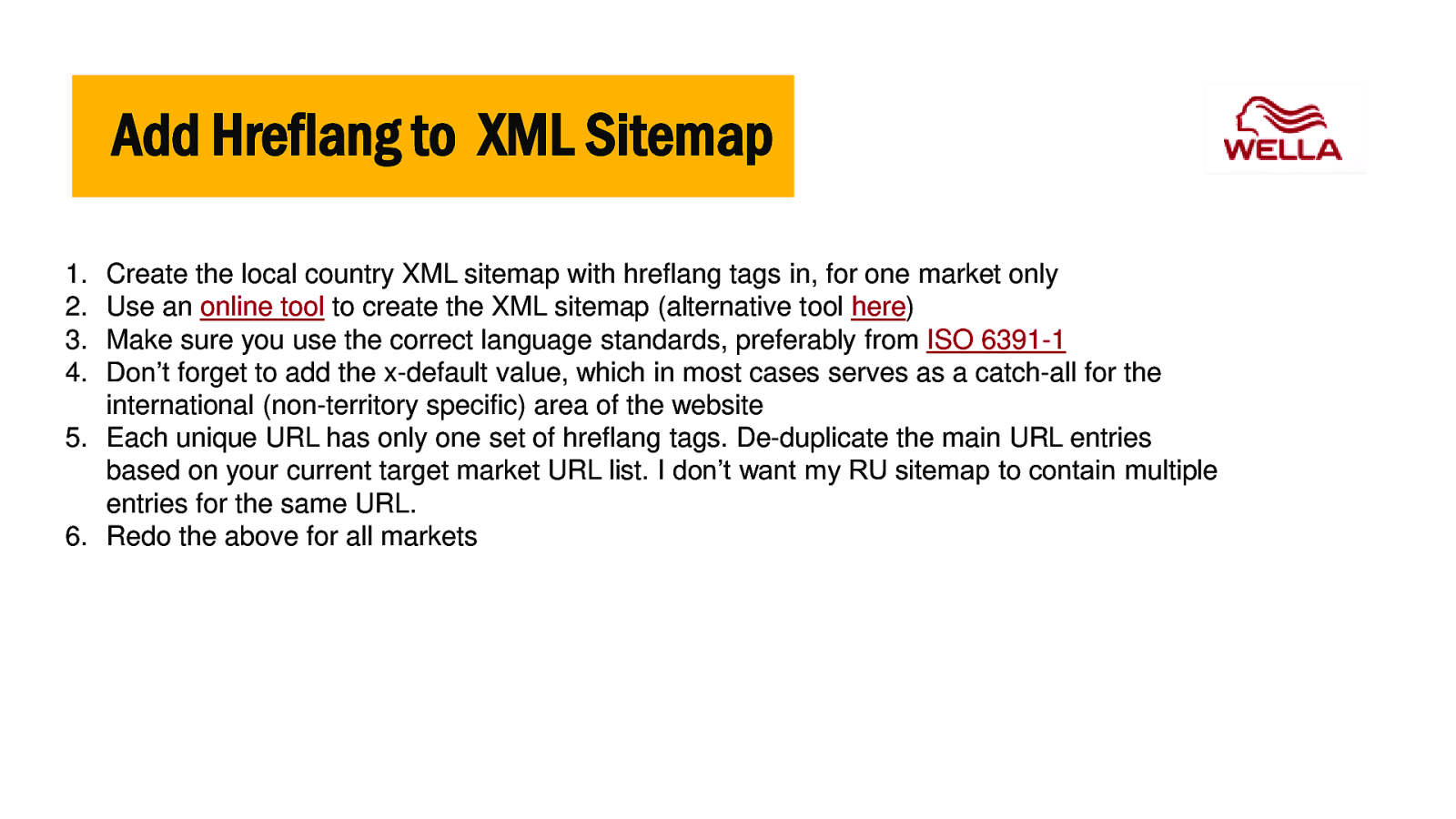
Add Hreflang to XML Sitemap 1. 2. 3. 4. Create the local country XML sitemap with hreflang tags in, for one market only Use an online tool to create the XML sitemap (alternative tool here) Make sure you use the correct language standards, preferably from ISO 6391-1 Don’t forget to add the x-default value, which in most cases serves as a catch-all for the international (non-territory specific) area of the website 5. Each unique URL has only one set of hreflang tags. De-duplicate the main URL entries based on your current target market URL list. I don’t want my RU sitemap to contain multiple entries for the same URL. 6. Redo the above for all markets
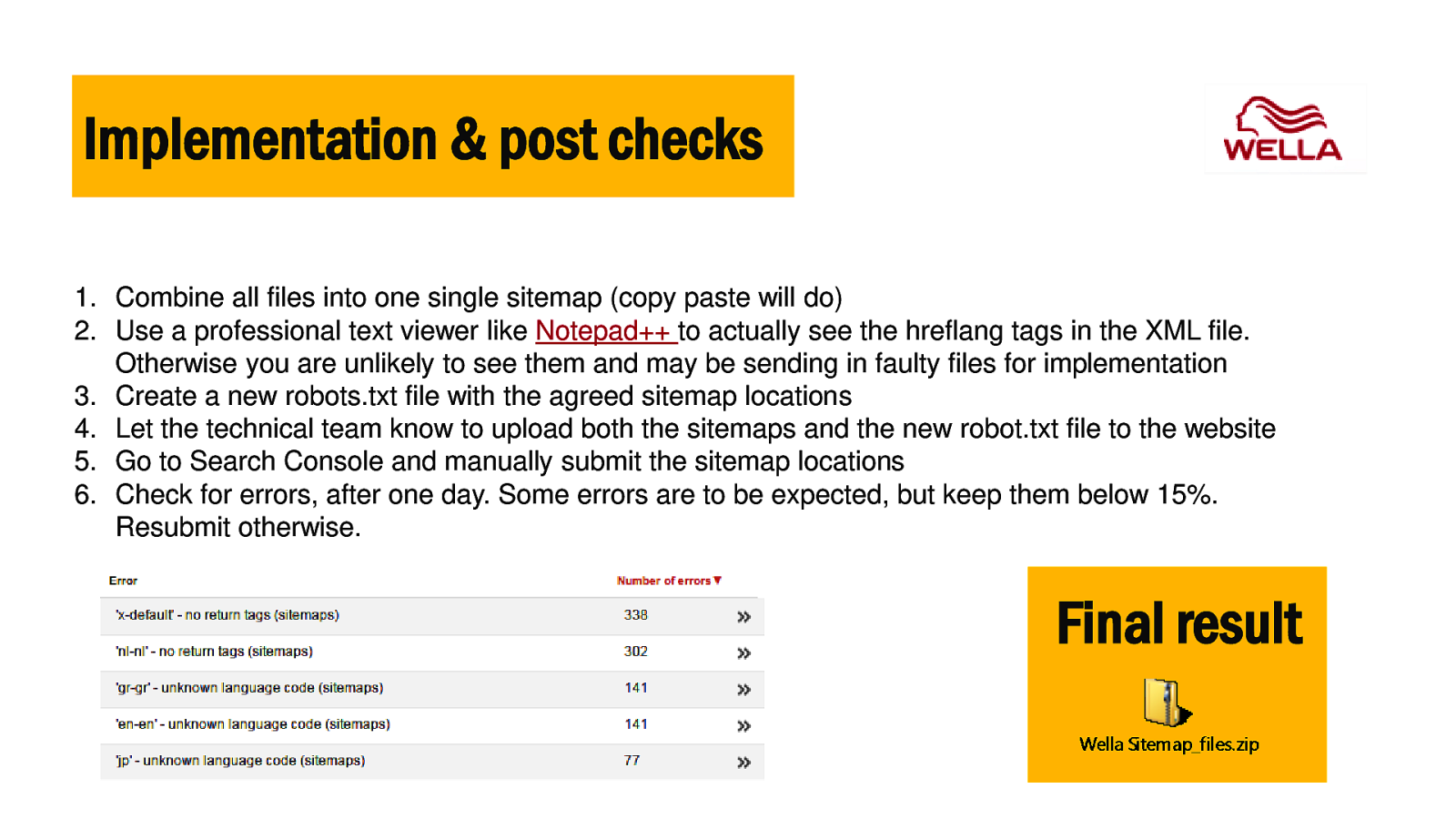
Implementation & post checks 1. Combine all files into one single sitemap (copy paste will do) 2. Use a professional text viewer like Notepad++ to actually see the hreflang tags in the XML file. Otherwise you are unlikely to see them and may be sending in faulty files for implementation 3. Create a new robots.txt file with the agreed sitemap locations 4. Let the technical team know to upload both the sitemaps and the new robot.txt file to the website 5. Go to Search Console and manually submit the sitemap locations 6. Check for errors, after one day. Some errors are to be expected, but keep them below 15%. Resubmit otherwise. Final result

Browsers don’t display hreflang code
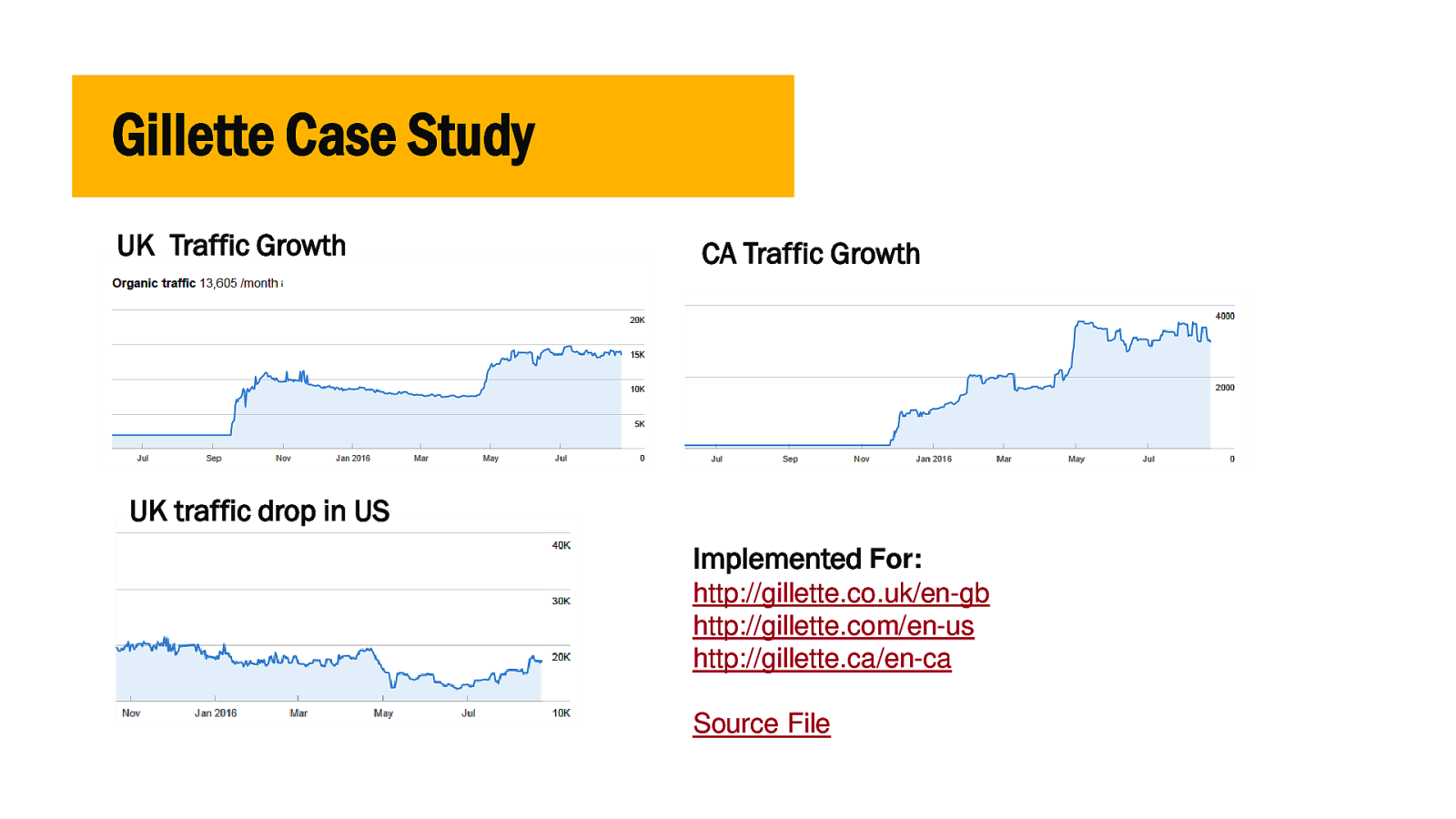
Gillette Case Study UK Traffic Growth CA Traffic Growth UK traffic drop in US Implemented For: http://gillette.co.uk/en-gb http://gillette.com/en-us http://gillette.ca/en-ca Source File

DESSERT
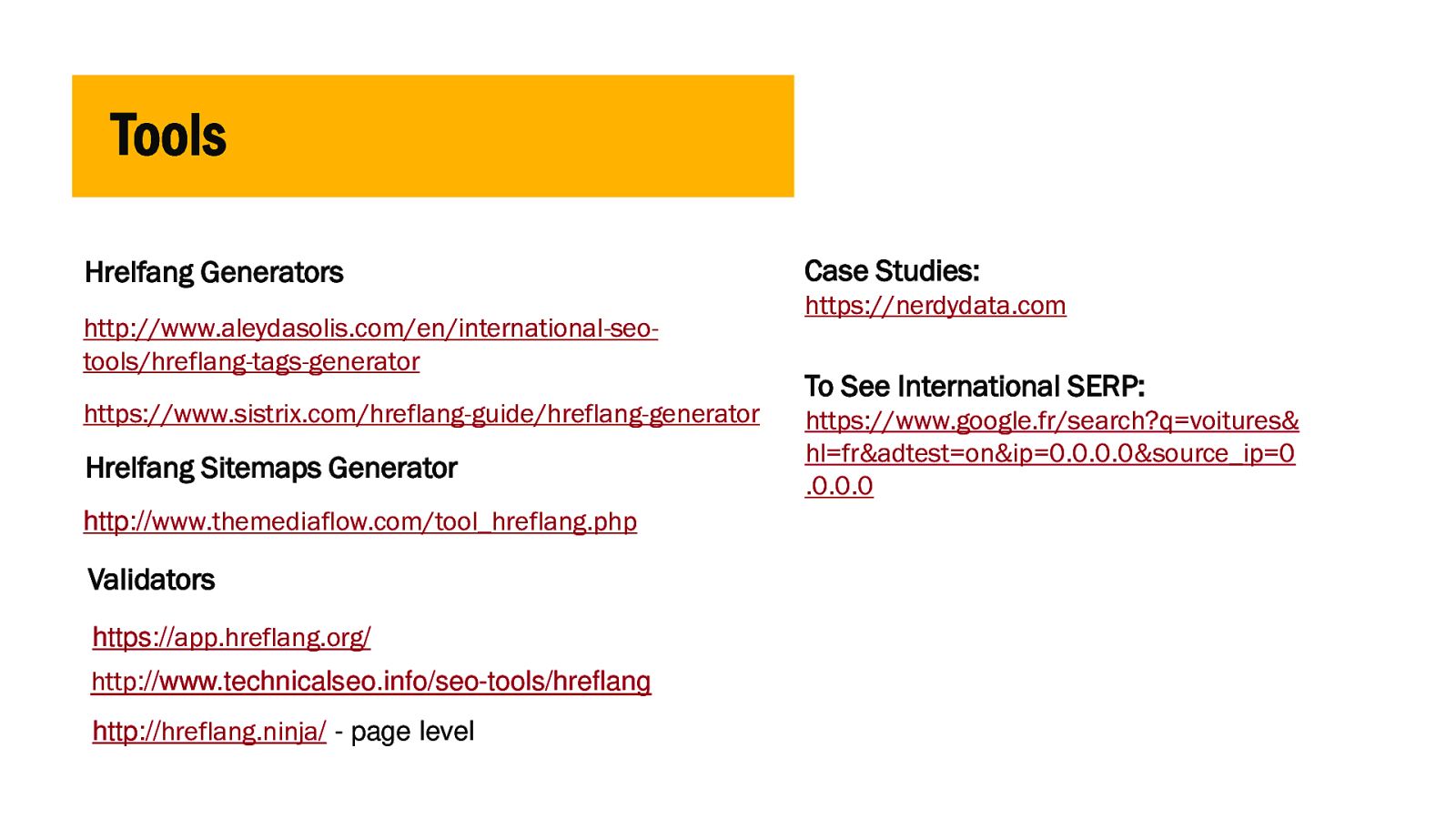
Tools Hrelfang Generators http://www.aleydasolis.com/en/international-seotools/hreflang-tags-generator https://www.sistrix.com/hreflang-guide/hreflang-generator Hrelfang Sitemaps Generator http://www.themediaflow.com/tool_hreflang.php Validators https://app.hreflang.org/ http://www.technicalseo.info/seo-tools/hreflang http://hreflang.ninja/ - page level Case Studies: https://nerdydata.com To See International SERP: https://www.google.fr/search?q=voitures& hl=fr&adtest=on&ip=0.0.0.0&source_ip=0 .0.0.0
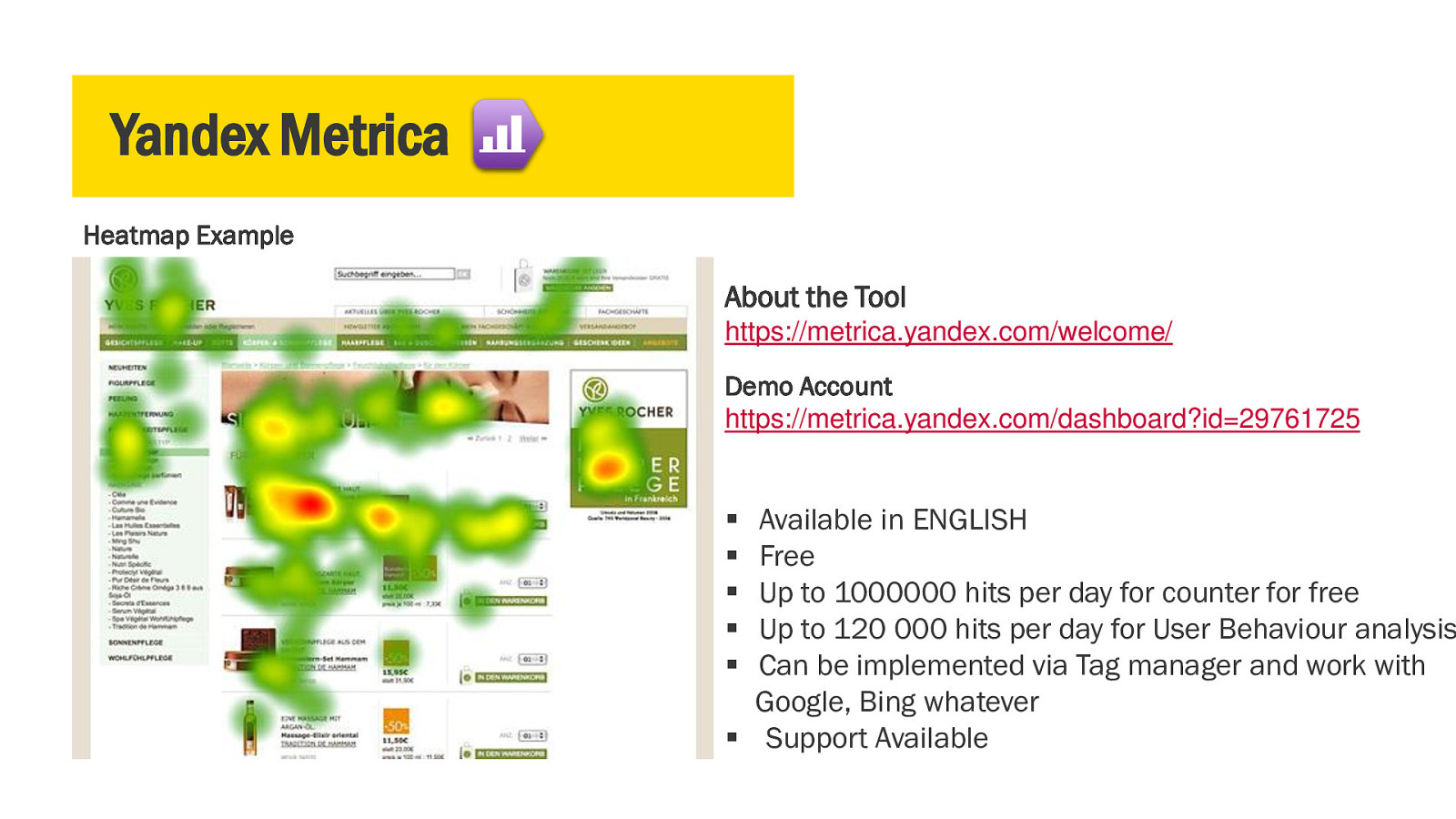
Yandex Metrica Heatmap Example About the Tool https://metrica.yandex.com/welcome/ Demo Account https://metrica.yandex.com/dashboard?id=29761725 Available in ENGLISH Free Up to 1000000 hits per day for counter for free Up to 120 000 hits per day for User Behaviour analysis Can be implemented via Tag manager and work with Google, Bing whatever Support Available

THE END THANK YOU